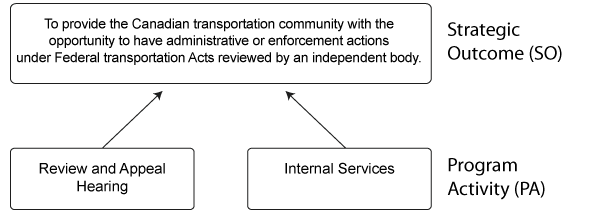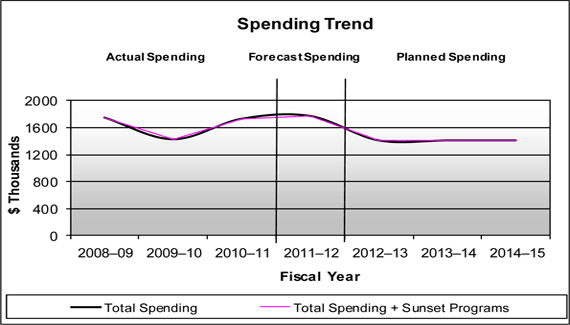Common menu bar links
Breadcrumb Trail
ARCHIVED - Transportation Appeal Tribunal of Canada - Report
 This page has been archived.
This page has been archived.
Archived Content
Information identified as archived on the Web is for reference, research or recordkeeping purposes. It has not been altered or updated after the date of archiving. Web pages that are archived on the Web are not subject to the Government of Canada Web Standards. As per the Communications Policy of the Government of Canada, you can request alternate formats on the "Contact Us" page.
Minister's Message
 It is my pleasure to present the 2012–2013 Report on Plans and Priorities of the Transportation Appeal Tribunal of Canada.
It is my pleasure to present the 2012–2013 Report on Plans and Priorities of the Transportation Appeal Tribunal of Canada.
The Tribunal is quasi-judicial and it focuses on the independent review of administrative and enforcement actions taken under the Transportation Appeal Tribunal Act, the Aeronautics Act, the Canada Shipping Act, 2001, the Marine Transportation Security Act, the Railway Safety Act, the Canada Transportation Act, the International Bridges and Tunnels Act and the Canada Marine Act.
Matters that the Tribunal hears include the suspension and cancellation of licences, certificates and other documents of entitlement, the issuance of railway orders and the administration of monetary penalties under various Federal statutes.
The Tribunal conducts its Review and Appeal Hearings throughout Canada in accordance with procedural fairness and the rules of natural justice. The adjudication process has an immediate effect on the aviation, marine and the rail sectors of the country, from coast to coast to coast.
Members are appointed with transportation specific experience and/or law backgrounds in order to efficiently and effectively address the myriad of issues that the Tribunal encounters. This has allowed the Tribunal to become an expert transportation related quasi-judicial review body and has enhanced the credibility and value of its decision making process.
In 2012, it is anticipated that there will be a significant increase in the number of Review and Appeal Hearings based on the economy, enhanced monitoring of the various modes of federally regulated transportation and the expanded mandate that the Tribunal now has in the marine sector (the Marine Transportation Security Act and the Administrative Penalty Regulations under the Canada Shipping Act, 2001). In concert with this, there is an increase in the reviews concerning the refusal to issue or amend marine documents.
The recruitment and retention of new full time staff and the additional Members required to fulfill the Tribunal's mandate are the two key challenges that have been identified for the next few years.
Fortunately, an excellent foundation exists with the present dedicated, professional staff and Members upon which the Tribunal can build on over the next four years.
I remain confident in the ability of the Transportation Appeal Tribunal of Canada to continue to be recognized as a leader in its field, nationally and internationally.
Denis Lebel, P.C, M.P.
Minister of Transport, Infrastructure and Communities
Section I: Organizational Overview
Raison d'être
The mandate and the jurisdiction of the Transportation Appeal Tribunal of Canada ("Tribunal") are provided for by the Transportation Appeal Tribunal of Canada Act. The Tribunal's principal mandate as a multimodal review body is to hold Review and Appeal Hearings at the request of interested parties with respect to certain administrative actions taken under various Federal transportation Acts.
Responsibilities
The Tribunal provides the national transportation community with the opportunity to have the Minister of Transport's enforcement and licensing decisions reviewed by an independent body.
The Minister's enforcement and licensing decisions may include monetary penalties or the suspension, cancellation, refusal to renew or refusal to issue or amend documents of entitlement on medical or other grounds.
These decisions are reviewed through a two-level hearing process: Review and Appeal Hearings. All Hearings are to be held expeditiously and informally, in accordance with the rules of fairness and natural justice.
At the conclusion of a Hearing, the Tribunal may confirm the Minister's decision, substitute its own decision, or refer the matter back to the Minister for reconsideration.
Strategic Outcome(s) and Program Activity Architecture (PAA)

Organizational Priorities
| Priority | Type[1] | Strategic Outcome(s) and/or Program Activity(ies) |
|---|---|---|
| Hold Hearings expeditiously and informally | Ongoing | To provide the Canadian transportation community with the opportunity to have administrative or enforcement actions under Federal transportation Acts reviewed by an independent body. |
| Description | ||
|
Why is this a priority?
Plans for meeting the priority
|
||
| Priority | Type | Strategic Outcome(s) and/or Program Activity(ies) |
|---|---|---|
| Increase awareness of the Tribunal with respect to its mission, mandate, role and results achieved | Ongoing | To provide the Canadian transportation community with the opportunity to have administrative or enforcement actions under Federal transportation Acts reviewed by an independent body. |
| Description | ||
|
Why is this a priority?
Plans for meeting the priority
|
||
| Priority | Type | Strategic Outcome(s) and/or Program Activity(ies) |
|---|---|---|
| Recruit additional Members | Ongoing | To provide the Canadian transportation community with the opportunity to have administrative or enforcement actions under federal transportation Acts reviewed by an independent body. |
| Description | ||
|
Why is this a priority?
Plans for meeting the priority
|
||
Risk Analysis
The Tribunal's activities are driven by external demands that it can only react to rather than plan for. The Tribunal's main risk is the added pressure on its resources from an increased and unpredictable workload, mainly from more enforcement proceedings from the marine sector.
In addition to further demand for its services, the Tribunal has had to manage ongoing increases in operating costs, such as per diems for Members, hotels, hearing rooms, court reporters, travel charges, IT upgrades and translation costs, while its funding budget has remained stable.
One of the most significant risks is the number of Members available to conduct hearings and their skill sets. In order to deliver on its mandate and program, the Tribunal needs to have Members with the right mix of skills and talents in all three kinds of transportation, as well as medical expertise.
The Tribunal has numerous strategies in place to handle these potential risks. The strategy includes identifying and implementing cost savings opportunities in its operating expenditures in areas such as IT and translation services. The Tribunal is also strengthening its efforts to attract qualified transportation experts to join the Tribunal as Members.
Planning Summary
| 2012–13 | 2013–14 | 2014–15 |
|---|---|---|
| 1,412 | 1,412 | 1,412 |
| 2012–13 | 2013–14 | 2014–15 |
|---|---|---|
| 12 | 12 | 12 |
| Performance Indicators | Targets |
|---|---|
| % of disposition of Review and Appeal Hearings within 120 days of request for hearing. | 100% decisions rendered within 120 days. |
| % of hearing Members provided with training or refresher courses. | 100% of hearing Members provided with training within 120 days of appointment. |
| % of registry staff provided with training. | 100% of staff provided with training at fiscal year-end. |
| % of decisions published on Web site. | 100% of decisions are published on the Web site within 120 days of the date of the decision. |
| Program Activity | Forecast Spending 2011–12 | Planned Spending | Alignment to Government of Canada Outcomes | ||
|---|---|---|---|---|---|
| 2012–13 | 2013–14 | 2014–15 | |||
| Review and Appeal Hearings | 1,423 | 1,072 | 1,072 | 1,072 | A safe and secure Canada |
| Total Planned Spending | 1,072 | 1,072 | 1,072 | ||
| Program Activity | Forecast Spending 2011-12 |
Planned Spending | ||
|---|---|---|---|---|
| 2012–13 | 2013–14 | 2014–15 | ||
| Internal Services | 350 | 340 | 340 | 340 |
| Total Planned Spending | 340 | 340 | 340 | |
Expenditure Profile
Departmental Spending Trend

Estimates by Vote
For information on organizational appropriations, please see the publication 2012–13 Main Estimates.
